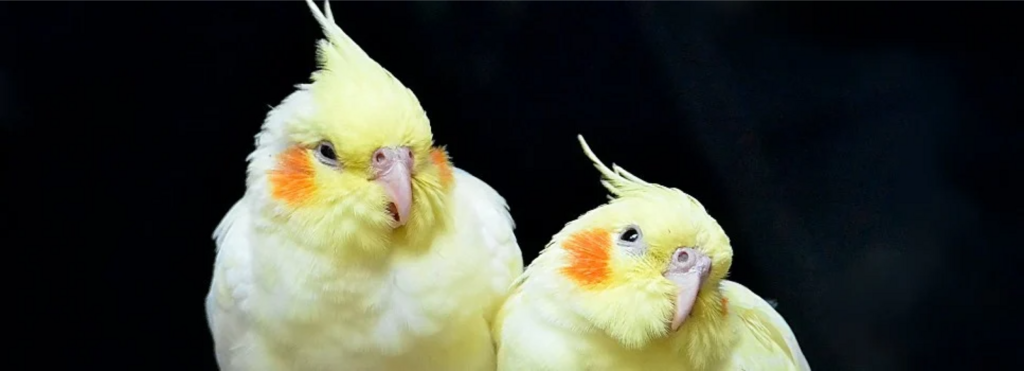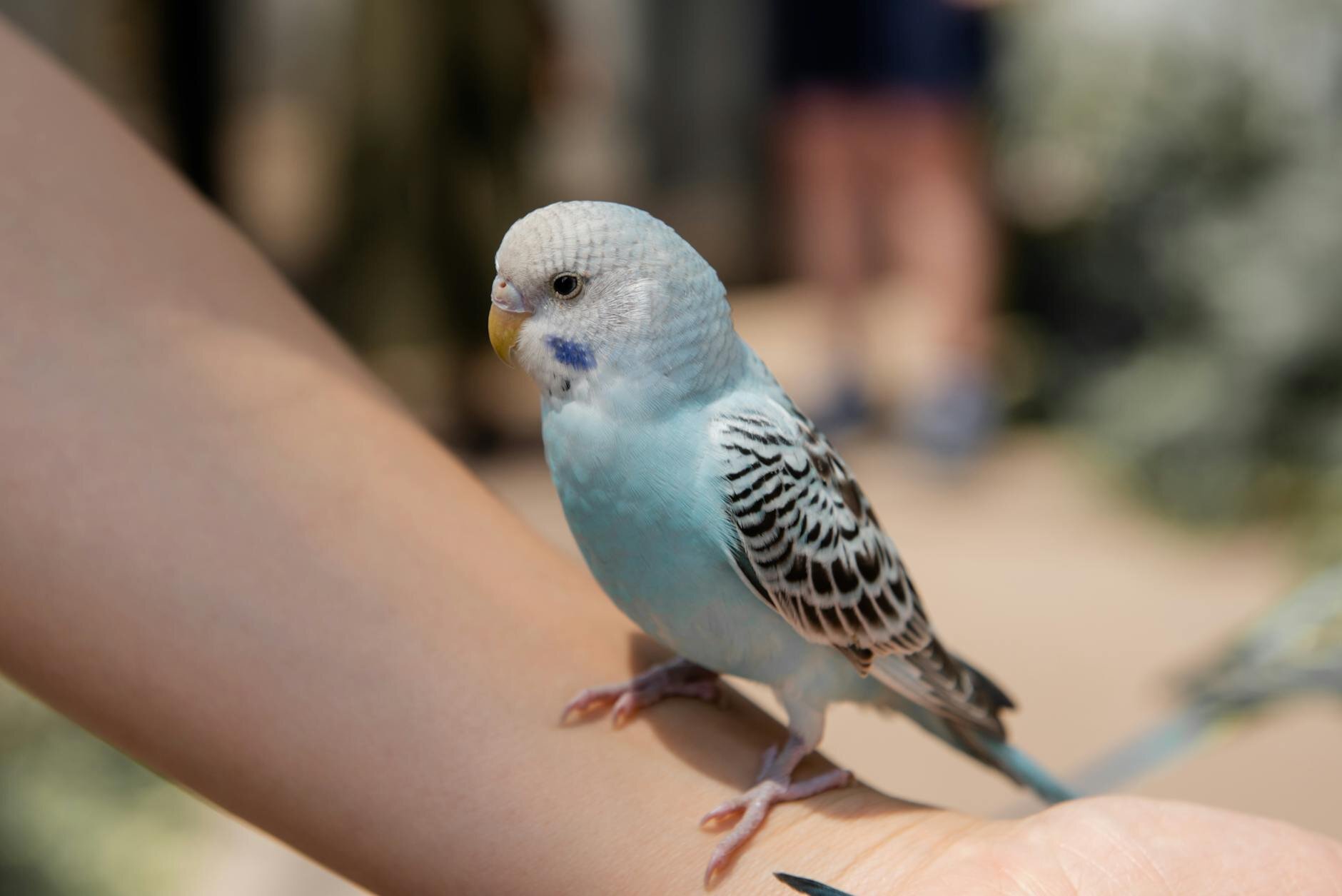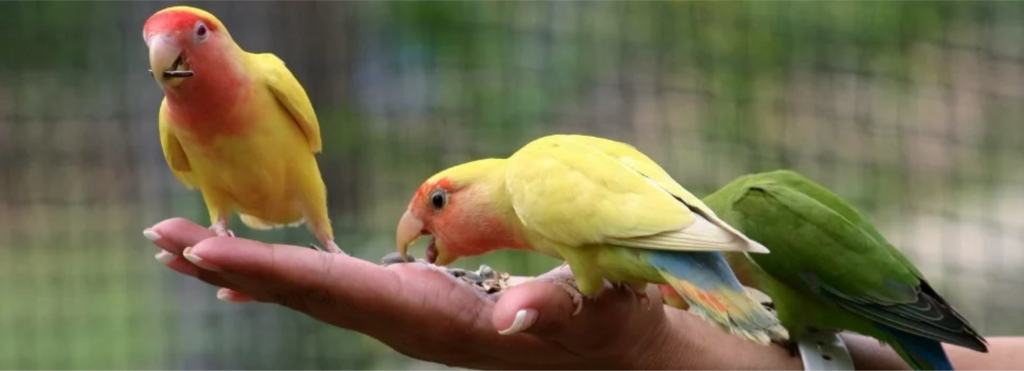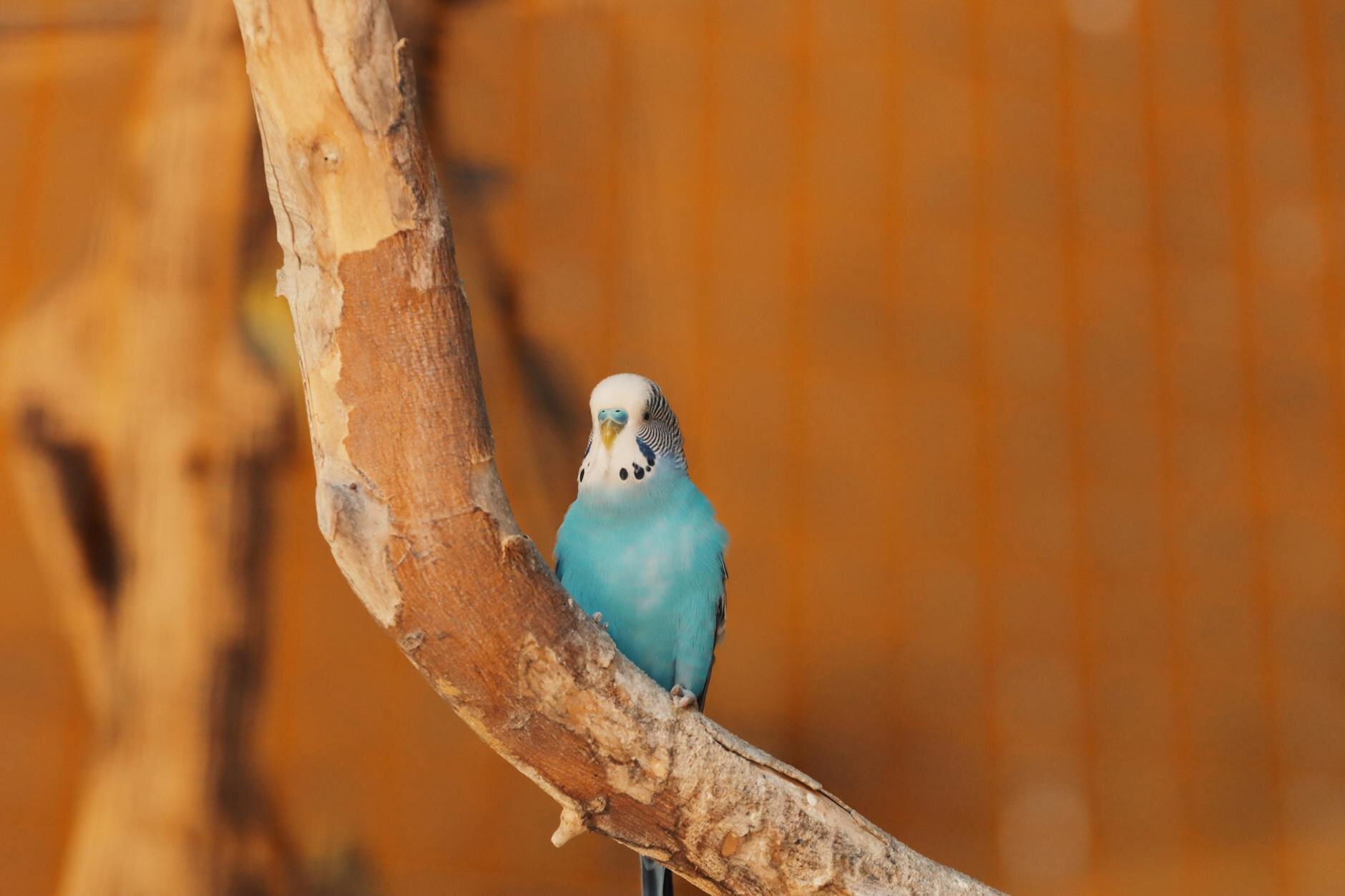Last Updated: 13/11/2025
Feeding Your Small Parrot
Checkout our Vet Guide on feeding your small Parrot!
Author: Dr Nicole Wynne BSc BVMS MANZCVS (Unusual Pets)
Reading Time: 5 minutes - short read
Commonly kept small parrots in Australia include budgerigars, cockatiels (weiros if you're in WA), and lovebirds. There are also several species of less common small parrots, including several species native to Australia! Other species include red-crowned parakeets (kakariki). Native species include Bourke’s parakeets, turquoise parakeets, scarlet parakeets, and elegant parakeets. Budgies and cockatiels are also native to desert regions of Australia!
Although small in size, these little parrots pack in heaps of personality, and require a varied, balanced diet to stay healthy. Contrary to popular belief, seed as the sole source of nutrition is a poor diet for parrots, and is high in fat, but low in lots of important vitamins and minerals. However, many parrots become “addicted” to seed due to the high fat content, just like how people can get addicted to junk food. So what is the right diet for small parrots? Keep reading to find out.
Diet

An appropriate diet for a small parrot should consist of no more than 40% seed but specific recommendations vary depending on the species. The remainder of the diet should consist a high quality formulated pellet or crumble, fresh vegetables and fruits, native seeding grasses and flowers for Australian birds. and a high quality pellet.
As a general overview this is a rough guide to feeding small parrots like cockatiels and budgies:
- 30-50% Commercial pellets or crumble
- 20-35% Vegetables - such as spinach, snow peas, capsicum, broccoli, chilli, corn , carrot, asian greens, beans etc
- 5-10% Fruits - blueberries, melons, strawberries, passionfruit, grapes, peaches, pear and apples etc
- 0-35% Seed - including commercial seed mixes and/or sprouted seed, which maximises their nutritional content!
- 1-5% Snacks for training - nuts, sunflower seeds, millet spray, pasta, brown rice
Pellets
For small parrots like budgies and cockatiels, pellets or crumble should comprise 30-50% of the diet. Other species of parrots can have up to 80% pellets but for these small desert species it's best to keep pellets at no more than half of their diet.
Pellets are formulated to be completely balanced and contain the right ratios of essential amino acids, vitamins and minerals that parrots need to thrive.
However, parrots are such complex little animals that no pellet diet can satisfy 100% of their nutritional needs, not to mention that they absolutely love the variety and challenge of fresh foods. Parrots are neophobic, which means that they can be hesitant to try new things.
It can be challenging to convert your parrot onto a pellet diet but it certainly is achievable. There are many strategies you can try. You can read more in our article Why Your Bird Should be Eating Pellets.
Fruit and Vegetables
Suitable fresh fruit and vegetables include broccoli (cooked) pumpkin, (cooked) sweet potato, leafy greens like spinach, celery, and bok choy, berries, apple, carrot, peas, capsicum, and pear.
Avocado, onion, garlic, and ginger are toxic to birds.
Fresh food can be cut up into “chop,” which can then be refrigerated for up to a week, or can be fed as whole pieces of fruit and vegetables.
Large or whole pieces of fresh food like pumpkin, cucumber, and cobs of corn with the husk can be fed as-is for a fun activity - parrots love nothing more than to make a mess!
When feeding fresh foods you should aim for 75% vegetables to 25% fruits due to the high natural sugar content in fruit.
Seed
Whilst commercial dry seed mixes can be fed in smaller quantities, they don't offer the best nutrition for your bird. Grass seeds and sprouted seed offer a more nutritionally dense way to feed seed.
Fresh grass seeds can be picked from your lawn in the warmer months, and birds normally love them! Grass seeds are ready for picking once they start to form firm seed heads, and bunches can be hung in the aviary or cage for your birds to forage from. They also make a great environmental enrichment option, promoting natural behaviours. Consider growing some in a pot and letting your birds enjoy them!
Dried seed can also be sprouted, which reduces the fat content and increases the vitamin content. Sprouted seed can be fed once the little sprouts start to turn green, usually in 2-3 days in warm weather.

Nuts and Treats
Nuts such as walnuts, macadamias, and peanuts are treat foods, and should only be given in small amounts. Nuts should be broken into small pieces for small parrots, rather than fed whole and ideally reserved for use as training treats. Small parrots can have the equivalent of a walnut once a week.
Other suitable treats include millet sprays, sunflower seeds and sweeter fruits peach, grapes, and banana. Treat foods can be given twice a week. Millet sprays and should be removed after an hour or two, and placed back in the next week, as birds will selectively choose to eat these treats over healthier foods, just like us! Remember to remove millet sprays which have been contaminated with faeces.
Feeding accessories

Metal feeding bowls are better than plastic bowls, as plastic bowls accumulate tiny scratches throughout their life, which then harbour harmful bacteria and are difficult to clean. It is best to get uncomplicated bowls and dishes, and avoid hooded dishes or feeders with multiple components as they don’t stop your birds from being messy, and they’re impossible to clean. Consider adding bird specific cleaning disinfectants to your home routine to help maintain freshness when sprouting seed and general cleaning of feed containers and cages.
We recommend having 3-4 sets of dishes and bowls for your birds so they can be easily cleaned and replaced twice a day. They also allow you to easily mix foods. For example, seed and pellets can be mixed up with vegetable and fruit chop.
Multiple fresh water stations should always be available, and avoid placing food and water feeders under perches, as they are more likely to become contaminated with waste.
Using food as enrichment

Parrots forage for large amounts of time in the wild, and it is easy to create similar opportunities for pet birds. A plastic cat litter box can be filled partway with dry leaves, hay, or shredded paper, and their daily ration of dry seed can be sprinkled over, providing hours of entertainment!
Snuffle mats designed for dogs and cats are also a great way of getting birds to forage and look for their food.
Food puzzle toys are fantastic for parrots as they have excellent problem solving skills! We stock some excellent parrot-specific toys, and several food puzzle toys designed for dogs are suitable for parrots too. Getting 3-4 different toys allows you to use them in rotation - you’ll be surprised at how quickly your parrot figures them out!
Finally, natural foliage acts as a beautiful enrichment item, and fresh fruit and vegetables can be hidden amongst the leaves. Do ensure that natural branches and leaves are hosed off and thoroughly sun-dried before using. Native flowers are an excellent addition, especially for Australian birds that have evolved to incorporate nectar, pollen, and petals in their diets.
Further Reading
Want to read more? Check out our other articles:
Why Your Bird Should be Eating Pellets
History
Our experts continually monitor the health and wellness space and we update our articles when new information becomes available.
Mon 20 Oct 2025
Edited by Dr Olivia Clarke BSc BVMS MANZCVS (Unusual Pets, Avian)Medically reviewed by Dr Olivia Clarke BSc BVMS MANZCVS (Unusual Pets, Avian)Dr Nicole Wynne BSc BVMS MANZCVS (Unusual Pets)
Veterinarian, MANZCVS (Unusual Pets)
Dr. Nicole graduated from Murdoch University in WA in 2014, and immediately started working in exotics-only practice. She was also one of the few vets in Australia that would routinely see venomous snakes ranging from death adders to tiger snakes. Although Dr. Nicole enjoys seeing all exotic pets, her absolute favourite are rabbits. She passed her Australian and New Zealand College of Veterinary Scientists Membership (MANZCVS) exam in unusual and exotic pets in 2021.

